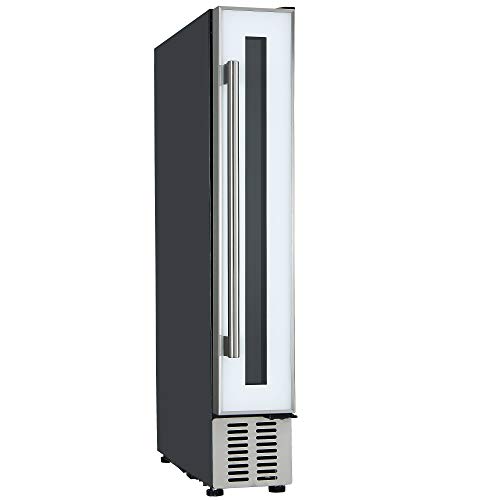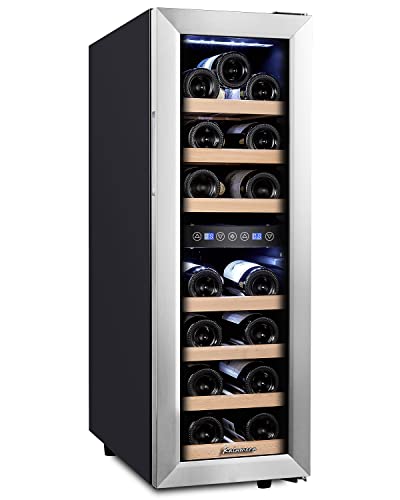Could Wine Fridge Cooler Be The Answer To 2024's Resolving?
Wilma Morrissey
0
4
01.05 08:16
 The Benefits of a Wine Fridge Cooler
The Benefits of a Wine Fridge CoolerA wine fridge cooler preserves bottles at the ideal temperature for aging and achieving their full potential. A good wine refrigerator also controls humidity levels to prevent corks from drying and oxidizing.
Consider a wine refrigerator that has dual or multiple temperature zones. This feature is ideal when you have a range of wines that require different storage conditions.
Compressor-Based Cooling
Wine fridge coolers use compressor technology to keep your favorite wines at the ideal temperature for serving or storing. This kind of cooling system can be found more often in beverage refrigerators. It gives a more uniform temperature throughout the refrigerator.
Wine refrigerators with this cooling technology are available as freestanding or built-in models that allow you to add the ideal wine storage solution to your bar area, kitchen, wine cellar or closet. They can be placed under counters or recessed, and in many cases come with front-facing ventilation, so that they be seamlessly integrated with the other kitchen appliances.
In addition to keeping the correct temperature, wine refrigerators with this cooling technology also provide important functions to store wine chiller uk. For instance, they could be equipped with a humidity control system that checks the temperature of the air inside the refrigerator and adjusts the flow of water to ensure that the wine bottles are properly humidified. This prevents oxidation, which can alter the flavor of the wine.
Some wine coolers have triple or even dual temperature zones, which means you can keep different types of wine at the optimal temperature. This is a great choice for those who serve red and white wines, or want their wine collection divided into various categories of storage.
Some Small wine chiller fridge refrigerators use this type of cooling to provide an UV-resistant door that shields the wine from harmful UV rays.
In addition to their capability to cool wine at the right temperature, wine refrigerators equipped with this technology are usually quiet and don't produce any vibrations. They don't use liquid refrigeration, and consequently do not have moving parts which vibrate or cycle when they are running. This reduces the vibrations that can cause loose hardware and other issues in the wine refrigerator cooler. This helps reduce the noise and keeps your wine tasting good.
Thermoelectric Cooling
Thermoelectric coolers differ in technology than compressor-based units. Instead of using refrigerants, thermoelectric coolers rely on Peltier effect to keep wine bottles cool. The Peltier effect is when an electrical current is pushed through two metal pieces that are connected together which causes one side to heat up while the other cools down. This temperature difference is what allows the cooler to keep an icy temperature inside the cabinet.
In most cases, the cooler will use an air source to distribute cold air across the interior of the cabinet. This is usually an aluminum piece that has been electrolyzed that increases its surface area to help disperse heat. Fans are located on either side of the heat sink in order to circulate air and ensure a constant temperature.
The main benefit of this technology is that it is environmental green. Thermoelectric wine fridges do not use refrigerants, and are therefore less damaging to the environment than coolers that use compressors. They are also cheaper to run and consume less energy than compressor-based coolers.
It is crucial to keep in mind that compressor units are more effective at keeping wine bottles at optimal temperature than thermoelectric wine coolers. This is because they are not able to get as cold as they are required to be. Also, because they are always running, they require more frequent maintenance than their compressor-based counterparts.
In addition to their eco-friendly and energy efficient capabilities thermoelectric wine refrigerators are also quiet. This makes them a fantastic option for people who live in homes or restaurants where it is essential to maintain the ambience of the space. They are also great for living spaces where people want to entertain guests or have the wine on their own. They can be placed anywhere in the house or restaurant and without causing any disturbance. This is due to the fact that they don't rely on noisy compressors or motors.
Humidity Control
Wine is sensitive to its environment and needs precise conditions to properly age. Temperature and humidity play vital aspects in the process, protecting cork integrity and preserving quality as time passes. A wine fridge keeps an ideal temperature range and controls humidity to ensure the perfect maturation process.
The ideal humidity for storing wine ranges between 50 and 70. If the humidity drops, there is a risk of oxidization that can develop off-flavors and cause the wine to lose its flavor. Mold and mildew also thrive in high humidity, which can damage labels or compromise the quality of cork. Wine refrigerators create a climate that discourages the development of mildew and mold while preserving the appearance and taste of wine.
Many wine refrigerators are equipped with humidity control systems in order to ensure appropriate levels of humidity. These systems use a built-in hygrometer to monitor the air quality in the wine cellar and then automatically adjusts the humidity levels to ensure that it stays within the desired range.
Some wine and beverage refrigerator fridges have internal fans to circulate air and prevent pockets from creating. This ensures that the temperature remains constant throughout the wine storage area and helps reduce energy consumption by limiting fluctuations in temperature.
Most slim wine refrigerator refrigerators come with doors made of double-paned or solid glass that provides insulation and protection against harmful UV rays. These can degrade wine compounds and alter the flavor of wine. Some wine fridges are equipped with vibration-reduction systems to limit disturbances that could cause sediment to be disturbed in older bottles, or disrupt the aging process.
While passive cooling methods are effective in reducing humidity, you may require introducing additional moisture into your wine fridge if it's been operating in inadequate conditions for prolonged periods of time. Air dehumidifiers, moisture absorbers made of mineral salts or crystals can be used as short-term solutions to suck up water vapour from the air. These devices must be cleaned and replaced on a regular basis. If you're seeking a long-lasting solution, consider installing an active humidity control system made up of a water atomizer evaporator module and an water tank.
Capacity of Storage
If you frequently drink wine and want to keep a few bottles on hand for spontaneous or unplanned occasions, then having a reliable wine fridge is invaluable. These fridges recreate the ideal conditions found in caves and natural cellars so that your wines can be infused with full-bodied flavors over time.
Wine is a complex mix of chemicals that interact to create distinct aromas and flavors. A proper storage environment will preserve these qualities, and prevent premature ageing. This can deprive the wine of its essence. In a typical fridge, temperature fluctuations can cause these molecules to break down, causing the flavors to fade. In a wine cooler consistent temperatures and humidity control prevent these problems.
Wine refrigerators regulate humidity to stop corks from drying out and leaching. If the wine bottle is stored in a very dry environment, it's possible that the labels will peel off. The wine could also lose its taste. Wine refrigerators maintain relative humidity levels between 55% and 75 %, protecting the integrity and flavor of the wine bottles.
These cooling systems often have internal fans to ensure that air circulation is uniform throughout the cabinet. This helps eliminate pockets of humid or warm air and keeps the entire collection at the same temperature. Many units also include racks and shelves designed to softly and securely hold bottles. This helps to protect the bottles from damage and helps you to organize your collection in a way that is efficient.
Certain wine refrigerators come with dual temperature zones, which can be useful for storing different types of wine at their optimal temperatures. These devices also have LED lighting and UV-resistant doors. These features protect your wines protected from sunlight damage while making them easily accessible. Certain wine fridge integrated fridges also come with carbon filters that reduce odors in the air, which may get into the corks and alter the flavor of the wines.
 When choosing a wine refrigerator, think about how much space you have available and how extensive your collection is. Most wine coolers can be incorporated into cabinets or under counters, and come in a variety sizes and shapes. Some even have front venting so you can install them in a narrower space. Some wine refrigerators have shelves that can be adjusted, allowing you to take in bottles with odd shapes.
When choosing a wine refrigerator, think about how much space you have available and how extensive your collection is. Most wine coolers can be incorporated into cabinets or under counters, and come in a variety sizes and shapes. Some even have front venting so you can install them in a narrower space. Some wine refrigerators have shelves that can be adjusted, allowing you to take in bottles with odd shapes. 








